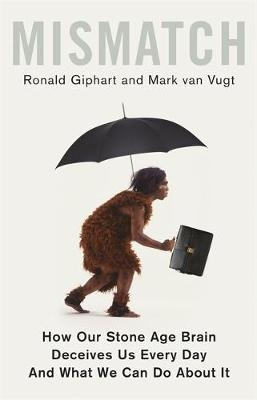
Mismatch
How Our Stone Age Brain Deceives Us Every Day (And What We Can Do About It)
Seiten
2018
Robinson (Verlag)
978-1-4721-3970-2 (ISBN)
Robinson (Verlag)
978-1-4721-3970-2 (ISBN)
- Titel ist leider vergriffen;
keine Neuauflage - Artikel merken
An exciting new popular psychology book looking at the troubling conflict between how our brains have evolved to meet Stone Age demands, and the very different modern problems of the world we now live in.
Our brains evolved to solve the survival problems of our Stone Age ancestors, so when faced with modern day situations that are less extreme, they often encounter a mismatch. Our primitive brains put us on the wrong foot by responding to stimuli that - in prehistoric times - would have prompted behaviour that was beneficial. If you've ever felt an anxious fight or flight response to a presenting at a board meeting, equivalent to facing imminent death by sabre-toothed tiger, then you have experienced a mismatch.
Mismatch is about the clash between our biology and our culture. It is about the dramatic contrast between the first few million years of human history - when humans lived as hunters and gatherers in small-scale societies - and the past twelve thousand years following the agricultural revolution which have led us to comfortable lives in a very different social structure. Has this rapid transition been good for us? How do we, using our primitive minds, try to survive in a modern information society that radically changes every ten years or so?
Ronald Giphart and Mark van Vugt show that humans have changed their environment so drastically that the chances for mismatch have significantly increased, and these conflicts can have profound consequences.
Reviewed through mismatch glasses, social, societal, and technological trends can be better understood, ranging from the popularity of Facebook and internet porn, to the desire for cosmetic surgery, to our attitudes towards refugees.
Mismatches can also affect our physical and psychological well-being, in terms of our attitudes to happiness, physical exercise, choosing good leaders, or finding ways to feel better at home or work.
Finally, Mismatch gives us an insight into politics and policy which could enable governments, institutions and businesses to create an environment better suited to human nature, its potential and its constraints.
This book is about converting mismatches into matches. The better your life is matched to how your mind operates, the greater your chances of leading a happy, healthy and productive life.
Our brains evolved to solve the survival problems of our Stone Age ancestors, so when faced with modern day situations that are less extreme, they often encounter a mismatch. Our primitive brains put us on the wrong foot by responding to stimuli that - in prehistoric times - would have prompted behaviour that was beneficial. If you've ever felt an anxious fight or flight response to a presenting at a board meeting, equivalent to facing imminent death by sabre-toothed tiger, then you have experienced a mismatch.
Mismatch is about the clash between our biology and our culture. It is about the dramatic contrast between the first few million years of human history - when humans lived as hunters and gatherers in small-scale societies - and the past twelve thousand years following the agricultural revolution which have led us to comfortable lives in a very different social structure. Has this rapid transition been good for us? How do we, using our primitive minds, try to survive in a modern information society that radically changes every ten years or so?
Ronald Giphart and Mark van Vugt show that humans have changed their environment so drastically that the chances for mismatch have significantly increased, and these conflicts can have profound consequences.
Reviewed through mismatch glasses, social, societal, and technological trends can be better understood, ranging from the popularity of Facebook and internet porn, to the desire for cosmetic surgery, to our attitudes towards refugees.
Mismatches can also affect our physical and psychological well-being, in terms of our attitudes to happiness, physical exercise, choosing good leaders, or finding ways to feel better at home or work.
Finally, Mismatch gives us an insight into politics and policy which could enable governments, institutions and businesses to create an environment better suited to human nature, its potential and its constraints.
This book is about converting mismatches into matches. The better your life is matched to how your mind operates, the greater your chances of leading a happy, healthy and productive life.
Ronald Giphart (Author) Ronald Giphart is an award-winning and best-selling novelist with a strong interest in psychology and human behaviour. He met Professor Mark van Vugt when he worked as a creative writing teacher at the VU University Amsterdam. Mark van Vugt (Author) Mark van Vugt is Professor of Evolutionary, Work and Organizational Psychology at VU University, and research associate at Oxford University. He is the author of the international success Leadership (2011), and a regular contributor to national and international media channels such as the BBC, Channel Four, ABC, CNN, Nature, New Scientist, The Times and The Daily Telegraph. Van Vugt is also consulting editor of various psychology journals.
| Erscheinungsdatum | 04.02.2018 |
|---|---|
| Verlagsort | London |
| Sprache | englisch |
| Maße | 156 x 234 mm |
| Gewicht | 464 g |
| Themenwelt | Sachbuch/Ratgeber ► Gesundheit / Leben / Psychologie ► Psychologie |
| Sachbuch/Ratgeber ► Natur / Technik | |
| Geisteswissenschaften ► Psychologie ► Biopsychologie / Neurowissenschaften | |
| Naturwissenschaften ► Biologie ► Evolution | |
| ISBN-10 | 1-4721-3970-4 / 1472139704 |
| ISBN-13 | 978-1-4721-3970-2 / 9781472139702 |
| Zustand | Neuware |
| Haben Sie eine Frage zum Produkt? |
Mehr entdecken
aus dem Bereich
aus dem Bereich
Buch | Softcover (2021)
Kohlhammer (Verlag)
29,00 €
mental gesund und stark in herausfordernden Zeiten
Buch | Hardcover (2024)
Droemer (Verlag)
20,00 €
der Leitfaden für die Praxis der Akzeptanz- und Commitment-Therapie
Buch (2023)
Arbor (Verlag)
42,00 €


